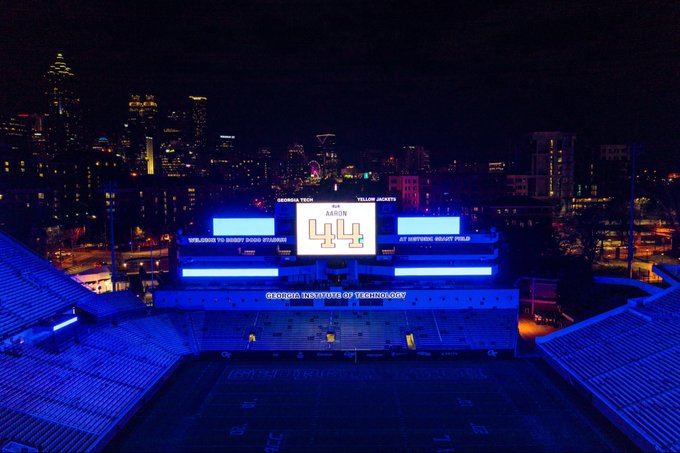Henry “Hank” Aaron passed on the morning of Jan. 22, 2021. Mr. Aaron is renowned in the Atlanta and American sports community for his unparalleled playing career and also for being a civil rights activist during and after his playing days. He started playing for the Braves while they were still located in Milwaukee in 1954 and remained with the team after they moved to Atlanta in 1966, playing through the 1974 season. His last two seasons in 1975 and ‘76 were back in Milwaukee with the newly formed Brewers organization. The beginning of his professional baseball career began in the Negro Leagues, playing for the Indianapolis Clowns. He was the final Negro League player to retire from Major League Baseball.
Statistically, Mr. Aaron is one of the all time titans of baseball. Over a 23 year playing career in the outfield, Mr. Aaron reached 25 straight All-Star Games, two were played per season from 1959-1962, became and still is the all-time leader in runs batted in and total bases and won the 1957 MVP award. He was part of the only Milwaukee Braves team to win the World Series, and in that same season, he hit .393 with 3 home runs in the postseason. He was Major League leader in runs twice, in hits twice, in home runs once, in RBI’s four times, in batting average twice, in slugging three times and in total bases four times. He was inducted into the National Baseball Hall of Fame in 1982 along with Frank Robinson, Travis Jackson, and Happy Chandler. He received the ninth-highest percentage of votes for an inductee, second-most at the time behind Ty Cobb. He would be an instrumental part of the Braves organization for the rest of his life, including being one deciding to draft future Hall of Famer Chipper Jones.
Mr. Aaron during his career stood in a place no other athlete had before; a Black professional athlete in the deep south. Even though Jackie Robinson broke the Major League Baseball color barrier with the Brooklyn Dodgers, playing in New York City was an incredibly different place to play compared to Atlanta in the 1950s and 1960s. Society was in many ways different,and similar too, when it came to how sports was seen and fit. The South did not have a person with an Arthur Blank kind of wealth to fund a professional team for a long time, nor did it have a city until Atlanta in the 1960s that could support a team like New York or Boston could. Major League Baseball was hard to interact with beyond the newspaper in the south, since they weren’t in range of local TV broadcasts and could only sometimes get radio broadcasts, mainly from St. Louis. Mr. Aaron was in a way part of a trail-blazing path to establish professional sports in the south and also professional Black athleticism.
Mr. Aaron had established his credibility and stature in baseball by the time he came to Atlanta by winning the MVP and World Series during his years in Milwaukee. He was also one of the elite sports idols for kids growing up at the time and one of the first that was southern based, coming from Alabama and eventually playing in Atlanta. His demeanor and tone during a tumultuous time in race relations as a prominent Black athlete never wavered. “What you saw was what you got,” said Emory Professor Hank Klibanoff in an interview about Aaron. “He never did anything to shake the idea as an eight year old what a hero should be.”
His chase for the, at the time, record-breaking 715th career home run, also came with a torrent of hate mail and death threats he received because he was a Black man going for a prestigious record held by a white man, Babe Ruth (who coincidentally finished his career as a Brave). According to the United States Postal Service, in 1974, Aaron received 900,000 pieces of correspondence, of which about a third “were letters of hate engendered by his bettering of Babe Ruth’s record.”
It is a miraculous feat of human emotional strength and endurance that Mr. Aaron had to battle through while going for the home run record, especially for the most famous record in the most popular American sport at the time.
His attainment of that record was not only a personal accomplishment for Aaron, but a tremendous win of sorts for the civil rights movement, proving the standards of equality had been and still were unequivocally broken for Black Americans. The fact Aaron remained as level headed as he did is truly remarkable, and a testament to how great a man he was.
Mr. Aaron’s famed legacy will perpetually live on in that home run, his nickname “The Home Run King,” but also in his stature as a crucial civil rights icon for Atlanta, the south, Major League Baseball, and American society as a whole.
Mr. Aaron’s jersey number, “44,” has been retired by the Atlanta Braves since 1977, and by the Milwaukee Brewers since 1976. For the coming 2021 seasons, Atlanta United, the Atlanta Falcons and Georgia Tech football have all announced they will be retiring #44. The Atlanta Hawks have already retired #44 for “Pistol” Pete Maravich.
A televised memorial service was held for Mr. Aaron on Tuesday at Truist Park, where Braves legends and Commissioner Rob Manfred spoke.
